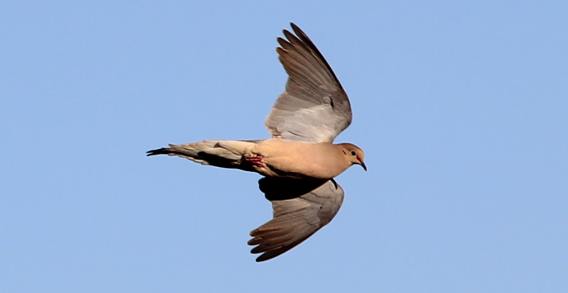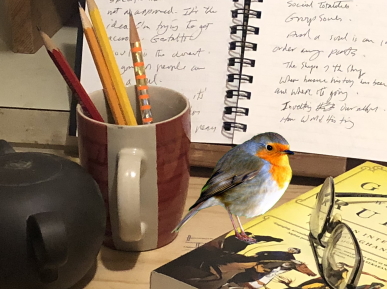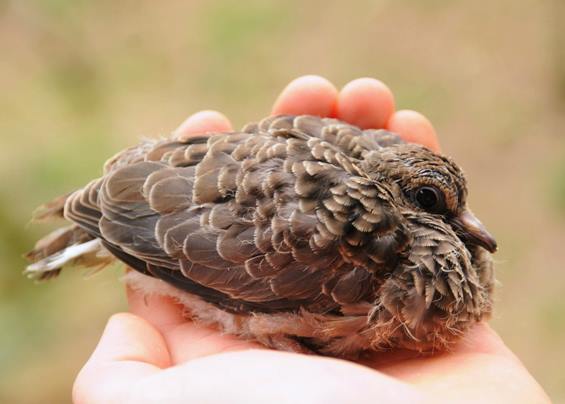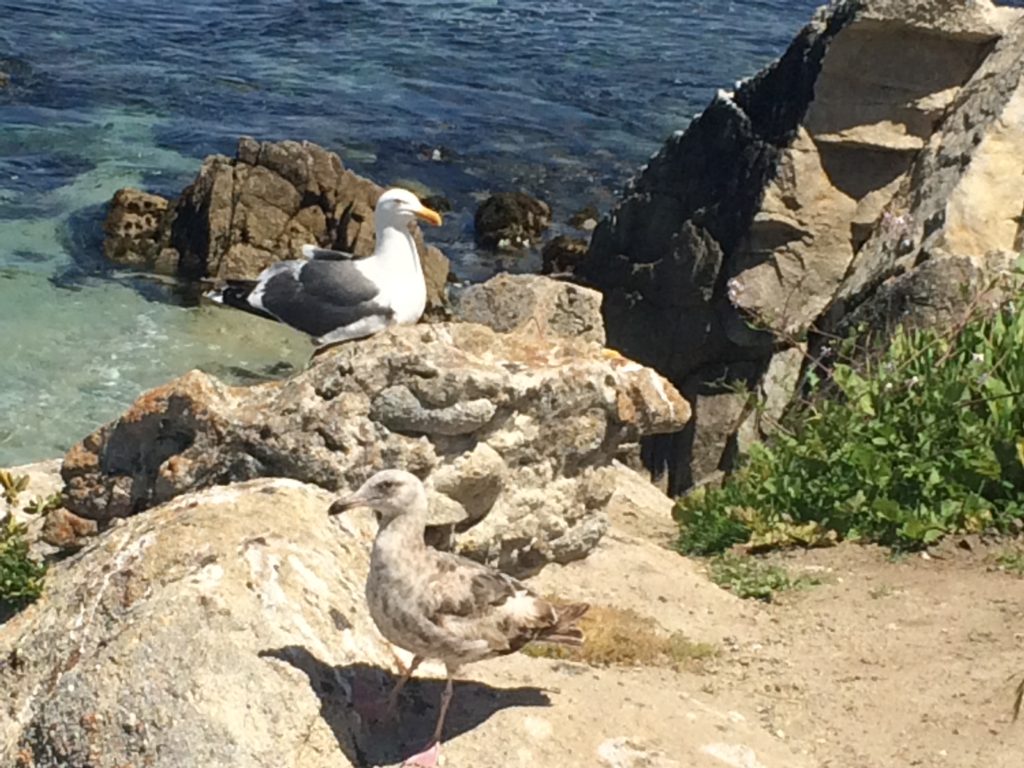Tamim Ansary

A small bird passed through my life sometime in the late 1990s. I was working at home back then, as I’ve done most of my adult life. My older daughter Jessamyn was out of town, so it was just me, my wife Debby, and our youngest daughter Elina in the house. Elina must have been about four.
That day, after taking Elina to school, I was down in my basement office attacking some writing project when suddenly a terrible squawking broke out in the back yard. I went out to investigate, and it turned all that ruckus was coming from two birds. They looked like half-sized pigeons with long tail feathers and ruddy patches on their breasts, and they were flying back and forth between two fences, diving and swooping over the lawn, and gibbering hysterically
The reason for their hysteria was clear. Their chicks had fallen out of the nest: three smaller, fatter, clumpier-looking birds lurking timidly among the shrubs behind the plum tree. One made a break for it, ran lickety-split on short legs, hopped up, beat its wings, lifted a foot or two into the air, crash-landed, snagging its feet in the grass, bonked comically beak first into the soil, and then took another running start and this time got aloft and made onto the fence. The second baby bird rose from the shrubs and managed to flutter to the lowest branch of the plum tree: it was safe! Its parents twittered with joy.
The third bird, however, never even beat its wings. It didn’t seem to know about flying. It just ran. It ran and ran, its legs a blur, across the open lawn, across the brick patio, down a short flight of concrete steps toward the basement. A cat had appeared behind me and two more on the fences.
The basement door was shut: nowhere to go. The bird stood there, waiting for its death. But I got to it before the cats. I cupped my hands around it. I could feel its soft back and its round breast. The parents, still shrieking, dive bombed me. I had to duck into the basement to get away, the little bird trembling in my cupped hands. I could feel its blood beating through all those feathers, its whole little body pulsing like a single heart.
In my office, I turned a milk crate upside down and caged the bird. But it bellowed “CHEEP!” and shot through the plastic lattice work as if the crate were a hologram. The gaps looked half the size of the bird but evidently, under its feathers, the bird was not much bigger than a caterpillar. I taped cheesecloth over the crate to secure the gaps, found the bird hiding under a pile of lumber near the water heater, and put it back where it would be safe. The bird stopped moving: it submitted passively to recapture. Outside, the other birds had vanished. The yard was silent.
At 5:00 o’clock Deb came home with Elina, who hopped out of the car, dressed as usual in some elaborate fairy princess regalia and holding up a colorful concatenation of paper, twine, and miscellaneous junk. “Look what I made. It’s a flying cat princess!”
I heaped obligatory praise on her work and then said, “Hey. I’ve got something to show you guys.”
The bird was standing in the middle of its cage like a plump little soldier. Elina’s astonished face lit up. “Is it ours?”
“No, honey. Not ‘ours.’ It’s a wild animal.” I told the story of saving its life and explained that we would feed it, care for it, and love it until it was old enough to fly and then let it go.
Debby flung herself into the project. She called a pet store to see what we should feed it. The man there chuckled at her question. “You’ve caught yourself a wild bird.”
“Not caught,” she demurred. “Saved. We’re going to let it go.”
“Might work out that way…” he said skeptically.
Debby drove to the store and came back with a bag of birdseed. “Incidentally,” she said, “the man at the store said we can’t put it back in the nest now. Once they’ve been handled by humans, their parents don’t want them back.”
Elina was jumping up and down. “Can I give it birdseed? Can I give it water?”
“It doesn’t look too happy in that box,” Debby said.
“Who could be happy cooped up like that? Let’s just turn it loose in the office,” I proposed. “Keep the door shut and give it the run of the place.”
But the bird didn’t really seem to appreciate the extra space. It ran on it’s eggbeater legs, one full circuit of the room, along the perimeter, till it found the bookcase and then ran into the darkness under the bottom shelf. And there it stayed.

When Elina scrunched down on her knees and reached for it, the bird let out one loud cheep.
“Leave it alone,” I told my daughter. “This is a wild animal. Okay? It’s not a pet. We have to be nice to it. Okay?”
“But Daddy—“
“No, not but-Daddy. We don’t touch it except if we have to. Okay?”
“But I want to pet it.”
“You can’t pet it.”
“I’ll be nice! Is she a girl-bird? I love a girl-bird.”
“She might be a girl-bird, but you can’t pet her. Look at me, Elina. No petting, okay? That’s not what a bird wants.”
“What does she want?”
“She just wants food and water—”
“I’ll get her some water! Can I give it to her in my special bowl?”
“Your special bowl would be fine,” Debby told her. Elina went skittering off, and Debby set a hand on my shoulder. “You’re going to leave this bird in your office all night? It’s going to make a mess.”
“I’ll put down some newspaper.”
“You’ll have to cover the whole floor.”
“I will.”
“And the desk. And all the shelves.”
“It can’t fly. It can’t get up on the desk.”
She thought about it and conceded this point. “Okay. But how long are we going to keep this bird?”
“Just till it can fly.”
“You better make it clear to Elina. She thinks this bird is part of the family now.”
When Elina came back with the water, I took her onto my lap and said, “You remember what I told you about this bird, right? It’s a wild animal.”
She nodded solemnly.
“As soon as it can fly, we have to let it go.”
“Because it wants to go back to its mommy?”
“No, not back to its mommy. It wants to go wherever it wants to go, that’s the way it is for wild animals. They like to be free. Birds want to fly way up high in the sky, and we have to help it do that. See? Right now, we’re just saving its life, because it can’t fly. It doesn’t know how. It’s too little. You know what I’m saying?”
Elina nodded, impressed by the solemnity of the occasion and with herself for being part of it. “We’re saving this birdie’s life,” she announced gravely.
That night, late, after Debby and Elina had gone to bed, I went down to my office just to check on the bird. It was standing stolidly in its corner, looking like one of those guards at Buckingham palace, except fat and short. It had its beak tucked down against its breast feathers now, the way those guards keep the chin straps of their helmets taut. I turned on the computer, thinking to get a little work done. A loud CHEEP sounded behind me.
I looked around. The bird’s eyes were half-lidded. It was falling asleep. But that CHEEP had been so loud! How could such a tiny chest blare forth so much volume? The birdseed was scattered. Next to Elina’s special bowl was a little splash of wet. Good: the bird must have eaten and drunk a little…
In the morning, Elina overslept, and there was no time for her to go downstairs and look at the bird. “You can look at her when you get home,” I assured her.
She went off to school, thrilled with the prospects of the afternoon.
Down in my office I saw the bird positioned against the corner, her eyes still half-lidded. She was exactly where she had been last night. Hmm. This didn’t feel right. I crouched down in front of her, extending my finger, hoping the bird would climb on, but it didn’t. The bird was dead.

Only the wall held her up. When I touched her with the tip of my finger, she toppled onto her side, legs extended rigidly, two little sticks. Why was she dead? She’d gotten food. She’d gotten water. She’d been safe in the office. I picked up the tiny body and discovered something shocking. The round swelling of chest just under her beak was like a balloon, the feathers all thinned away from the spot and the skin underneath a translucent bladder.
I walked to the back yard in a daze, carrying the dead bird on my open palm. Dead of what? A phrase from some long-forgotten story popped into my head. And her little heart burst. A Hans Christian Anderson tale perhaps? It must have been mere captivity that killed her. That was all I could figure. The need to be free had swelled inside her so unbearably, it had eroded her flesh, redistributed her bones, and stretched the skin thin enough to let light shine into her body. She had died of being saved.
I dug a little hole in the back yard and set the bird in it. When I looked up, I saw cats at three points of the compass. It struck me that they might dig up the bird just when Elina was out here playing. That must not happen. I got the fence post digger and rammed it into a patch of hard earth near the plum tree again and again until I had dug a hole the length of my arm. I wrapped the bird in a plastic bag and lowered her into the hole, wedged half a brick above her body, and then filled the hole with dirt and stamped the soil down. goddamn it, no cat, no possum, no raccoon was going to get to her.
When Debby came home, Elina burst through the front door. “We got a bird toy!” she shrieked, holding up some kind of tree-like wire frame.
My throat felt swollen. I hugged her, and I could feel the life beating through her small body. “The bird…”
She pulled away suspiciously at the tone of my voice. “The bird?”
I couldn’t say the words. I said other words. “I had to let her go.”
Elina worked through this puzzle. “She learned to fly already?”
What could I say? What else could I say? “Yes. She learned to fly.”
“But Daddy!” Elina protested. “I wanted to see her fly! You promised.”
“She wanted to go. I couldn’t keep her.”
“Is she flying now, Daddy?”
I thought of the bird in that hole under the soil I had stamped down, and then I lied. “Yes,” I said. “That bird is flying.”
And at that, Elina hugged my legs, forgiving me utterly. “That’s okay, Daddy, I’m glad you let her go,” she exulted. “I’m glad that bird is flying!”
